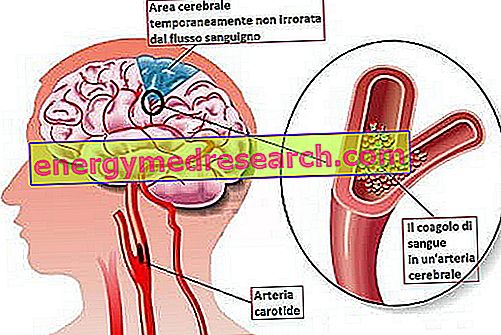Chronic diarrhea and mood
It is rather complicated to provide a universal definition of "chronic diarrhea", considering that each of us has a purely subjective conception of our intestinal activity. Some individuals tend to self-diagnose the disorder of "conical diarrhea" simply because the urge to go to the bathroom knocks on the door more than a few times a day.

Of course, it is not pleasant when diarrhea blocks us (... or unlocks us ...) in the middle of a conversation or examination; but we must not forget that diarrhea is nothing but a defensive response that the organism puts in place to protect us and to cleanse the intestine of waste, irritants and so on. Therefore, if the intestine is mobilized in an excessive way, there is always a clear and unequivocal motivation, even if not immediately recognizable.
At times, diarrhea seems to "become chronic" precisely in conjunction with some very specific events or circumstances, whether these tests, particularly stressful work activities, sports performance or otherwise. We need to keep in mind that it is certainly not a coincidence that the intestine is often compared to a "second brain": everything that happens at the brain level also affects the intestinal activity. Just to give an example, in the presence of anxiety, tension or stress, the intestine (which boasts proud of its second nickname) captures these sensations and responds with urgent rumblings and belly aches.
We must therefore distinguish chronic diarrhea proper from "psychological" or purely subjective. In this article we try to understand the true meaning of chronic diarrhea, focusing on the possible causes.
Simple diarrhea or chronic diarrhea?
By definition, "diarrhea" is a common defecation disorder which consists in the rapid emission of abundant faecal material, with a liquid or semi-solid consistency. To talk about real diarrhea, the discharges must be numerically higher (or equal) to the three daily ones, and the normal consistency of the stools must be altered.
In general, it can be said that diarrhea becomes chronic when the above condition persists daily for over 3-4 weeks.
Then...
Chronic diarrhea is distinguished by:
- Number of daily discharges greater than or equal to 3
- Alteration of stool consistency, which appear to be liquid or poorly formed
- Diarrhea persists for at least 3-4 weeks
In a healthy subject, chronic diarrhea can be a nuisance, a habit or, at worst, become a serious health problem. In contrast, for an immunocompromised patient (who therefore has an inefficient immune system), chronic diarrhea is a serious disorder that, for some, could be potentially fatal.
Causes
The search for the root causes of chronic diarrhea is not at all simple: in fact, the potential responsible factors are innumerable and heterogeneous.
Most often, chronic diarrhea is the result of diseases that affect the gastro-intestinal system, such as irritable bowel syndrome, ulcerative colitis, Crohn's disease, malabsorption syndromes and chronic infections.
In general, the triggering causes can be differentiated into two macrogroups:
- Causes of infectious origin
- Causes of extrainfective origin
CHRONIC INFECTIOUS DIARRHEA
Many times chronic diarrhea depends strictly on an infection, the symptoms of which remain until the source is eliminated. In such circumstances, the pathogens most involved are:
- Parasites: Cyclospora, Entamoeba histolytica (main responsible for amebiasis) , Giardia, Cryptosporidium
- Bacteria : Aeromonas, Clostridium difficile, E. coli, Campylobacter, Salmonella, Shigella
- Virus : Norovirus, Rotavirus
Intestinal infections induced by these pathogens are therefore a common cause of chronic diarrhea. More often, the alteration of evacuation frequency is observed in people staying in tropical countries, in developing areas and in travelers in general. Intestinal infections, which therefore induce chronic diarrhea, can be developed simply by eating infected food or by drinking contaminated water or infected milk that has not undergone the necessary pasteurization and sterilization processes.
CHRONIC NON-INFECTIOUS DIARRHEA
When chronic diarrhea occurs independently of bacterial, protozoan or viral infections, the cause can be sought in:
- Intestinal disorders, such as Crohn's disease, irritable bowel syndrome (one of the most common causes of chronic diarrhea), ulcerative colitis
- Malabsorption of bile acids (a characteristic condition of patients with congenital anatomical changes in the small intestine, Crohn's disease, functional disorders of the ileum, celiac disease and chronic pancreatitis or who have undergone surgical resection of the ileum)
- Abuse of laxatives and antibiotics
- Food intolerances (eg intolerance to soy proteins, lactose, sorbitol, etc.)
- Food allergy
- Autoimmune diseases and impaired immune system (eg AIDS)
- Neoplasms
- Zollinger-Ellison syndrome (ulcerative neoplasm affecting the upper digestive tract)
- Pancreatic diseases (eg pancreatic enzyme deficiency, chronic pancreatitis)
- Reduction of blood supply to the intestine
- Hereditary diseases (eg cystic fibrosis, enzyme defects)
- Gastrointestinal tract surgery
- Thyroid disorders: even some endocrine disorders such as hyperthyroidism can cause chronic diarrhea, often associated with weight loss
Curiosity: paradoxical chronic diarrhea
There is a particular type of chronic diarrhea, known to most as chronic paradoxical diarrhea, favored by fecal impaction. Let us briefly recall that fecal impaction - a compact and hard mass of dehydrated stools that lodges in the rectum-sigma or in other areas of the upper colon - is one of the major causes of chronic constipation. This type of chronic diarrhea is called "paradox" or "pseudo-diarrhea" precisely for this reason: in similar circumstances, the disorder is attributable to the passage of liquid fecal material around the block of dry and compact feces.



